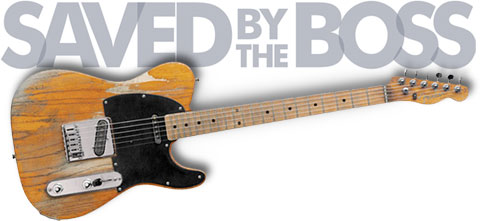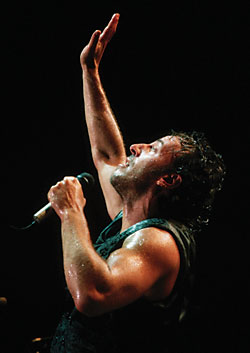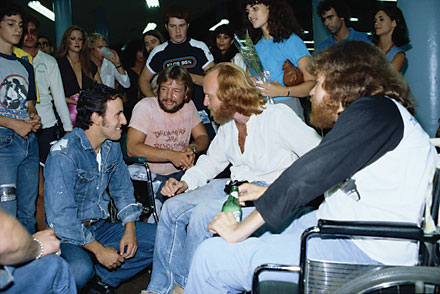 |
|||||||||
|
March/April 2016
How Bruce Springsteen Rescued Vietnam Veterans of America—and the Vietnam Veterans Movement BY MARC LEEPSON
It was altogether fitting and proper that Springsteen—the hard-rocking, 66-year-old Rock and Roll Hall of Fame musician, singer, and songwriter—recognized Muller, the founder and first president of Vietnam Veterans of America. That’s because Springsteen has been a strong supporter of Vietnam veterans and VVA for more than thirty-five years. “Strong,” in fact, barely describes Springsteen’s commitment to VVA and the men and women who served in the U.S. military during the Vietnam War. That’s because in 1981, three short years after the organization was founded, when VVA was at a financial crisis point and about to go under, Bruce Springsteen stepped in and saved the organization. “In those early years it was always hand to mouth,” said John Terzano, who ran VVA’s Washington, D.C., office in the early 1980s. “Figuring out how to pay our bills was a constant problem. We had to go months without paying the rent, and had numerous conversations about shutting down. We were in extra dire straits.” “We were hundreds of thousands of dollars in debt,” Muller said. “I’m in my [New York] office and I’m preparing to close down the organization [and] I get a call.” On the line: Jon Landau, Bruce Springsteen’s manager. Landau told Muller that Springsteen “was interested in Vietnam vets and you seem like the guy” to talk to. He invited Muller to see Springsteen perform the next night, July 3, 1981, at the Brendan Byrne Arena in the Meadowlands in East Rutherford, New Jersey. After the show—he was blown away—Muller and Springsteen met and talked. The upshot: Springsteen gave a benefit concert the next month in Los Angeles. That concert, on August 20, 1981, at the L.A. Memorial Sports Arena, sold out. Afterward, Bruce Springsteen presented VVA a check for $100,000, “a staggering sum of money,” as Muller put it. The money “gave us a new breath of life. We were saved,” Terzano said. “It didn’t pay all of our bills, but gave us the shot and hope we needed. The only reason we survived is because Bruce came around in 1981.” What’s more, Springsteen’s generosity “opened the door, and Pat Benatar and Charlie Daniels” gave VVA benefit concerts the following month. “It was our first foray into the musical arena,” Terzano said. “When you get a celebrity involved it opens so many doors, especially educating people and reaching more people. Plus, Bruce became a very close personal friend of Bobby and helped us out over the years. He gave us well over a hundred thousand dollars. It was an organization saver.” If “it wasn’t for Bruce coming forward,” Muller said, “there would not have been a coherent, national movement on behalf of Vietnam vets.” VVA “became the national group, the only national group, with a [congressional] charter.”
Bruce Springsteen came out on the Memorial Sports Arena stage on August 20 and walked up to the microphone. “Tonight we’re here for the men and the women who fought in the Vietnam War,” he said—a war that “turned this whole country into a dark street. Like at night when you just want to get home and out of the corner of your eye you see somebody gettin’ hurt and you keep walking on because it don’t have nothing to do with you. Unless we’re able to walk down those dark alleys and look into the eyes of the men and the women that are down there and the things that happened, we’re never going to be able to get home. “There’s a lot of guys here tonight [he had invited a group of disabled Vietnam veterans] that had to live it and live it every day. And there’s a lot of guys that made it home to America and died and didn’t make it down here tonight.” He then introduced Bobby Muller, who steered his wheelchair onto the stage. “It’s a great night for Vietnam veterans,” Muller said. “Very simply, there was a lot of controversy and there was a lot of pain surrounding the tragedy of Vietnam. And because of that a lot of people have tried to forget it and pretend that it never happened. “That doesn’t do much for the families of the 55,000 Americans that were killed in Vietnam. It doesn’t do much for the 300,000 that were wounded fighting that war. But tonight is the first step in ending the silence that has surrounded Vietnam.” Muller then spoke of veterans’ advocates who “have worked so hard for these years all over the country” on behalf of Vietnam veterans. He finished with these words: “It’s a little bit ironic, after the years that we’ve been trying, when the businesses haven’t come behind us and the political leaders have failed to rally behind us and [when] you remember the divisions within our own generation about the war, that it ultimately turns out to be the very symbol of our generation—rock and roll—that brings us together. “And it is rock and roll that is going to provide the healing process that everybody needs. So let’s not talk about it, let’s get down to it, let’s rock and roll.” The audience cheered loudly, and Springsteen and his E Street Band launched into Creedence Clearwater Revival’s “Who’ll Stop the Rain.” The reviewer for Rolling Stone magazine said Springsteen and company “transformed” that song “into a majestic call to arms” on behalf of Vietnam veterans. It “set the tone for the night,” Terzano said. “It was very haunting and very emotional.” It also sounded the note that saved Vietnam Veterans of America.
|
|||||||||
|
|
|||||||||
Endowing the Future |
|||||||||
8719 Colesville Road, Suite 100, Silver Spring. MD 20910 | www.vva.org | contact us |
|||||||||






















 Near the end of his sold-out concert January 29 in Washington, D.C., rock and roll legend Bruce Springsteen told the crowd of more than 18,000 that he had some special guests in the audience, a group of veterans from Walter Reed National Military Medical Center. Then he recognized another veteran in the house: Bobby Muller.
Near the end of his sold-out concert January 29 in Washington, D.C., rock and roll legend Bruce Springsteen told the crowd of more than 18,000 that he had some special guests in the audience, a group of veterans from Walter Reed National Military Medical Center. Then he recognized another veteran in the house: Bobby Muller.